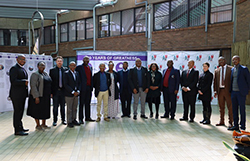North-West University’s MoU to Drive Public Sector Growth and Innovation
The North-West University (NWU) and the Public Service Commission (PSC) signed a Memorandum of Understanding (MoU) on Tuesday, 16 July to formalise and strengthen the relationship between the parties.
The MoU, which will remain in force for a period of five years, seeks to bring together the NWU and PSC to collaborate in areas of mutual interest such as the promotion of thought leadership, the production of relevant publications and community engagement initiatives. Other areas include collaborative research, capacity building and skills development – including internships and work-integrated learning.
In addition, the MoU serves as a beacon of the NWU’s commitment to addressing societal challenges and enhancing communities.
“It is such a pleasure to return to this great institution,” said Prof Somadoda Fikeni, chairperson of the PSC. “The signing of the MoU is a significant moment for the PSC, and it bodes well for our repositioning. Of importance is that the MoU will allow the commission, as a knowledge-based organisation, to collaborate with the University on areas of mutual interest. It is through this partnership that I hope that, through this partnership, we will be able to create not only career public servants, but also committed individuals who are people centered and service oriented.”
Echoing his sentiments, Prof Bismark Tyobeka, the principal and vice-chancellor of the NWU, emphasised the importance of professionalism in the public sector.
“Universities are a microcosm of society, and we are dedicated to collaborating with all spheres of government to work towards building a capable state, as outlined in the National Development Plan. Through various initiatives and programmes, we are already working towards addressing challenges faced by government and its departments. We eagerly anticipate the continuation of this important work, confident that it will contribute to the improvement of society,” said Prof Tyobeka.
The PSC’s mandate relates to monitoring, evaluating and making recommendations regarding the organisation, administration, personnel procedures and practices of the public service to ensure efficient, economic and effective performance. This aligns closely with the NWU’s key priorities, which emphasises the commitment to supporting and partnering with all spheres of government.
Prof Jeffrey Mphahlele, deputy vice-chancellor for research and innovation, , reaffirmed the NWU’s commitment to collaborate with the PSC. He said universities have a significant role to play in the professionalisation of public service by providing relevant curricula that mould students into responsible and accountable professionals that serve society with integrity when they enter the workforce.
“At the NWU, we are cognisant that qualifications alone do not develop a fully rounded graduate. Society has a crucial role to instilling professional ethics through role models at various levels, both in the public and private sector. The onus is on selecting the relevant positive role model(s) that resonates with your values and principles.”
Prof Mandla Makhanya, caretaker commissioner for the Northwest province, added that the cooperation between the parties will allow them to expand into local government and state-owned entities.

